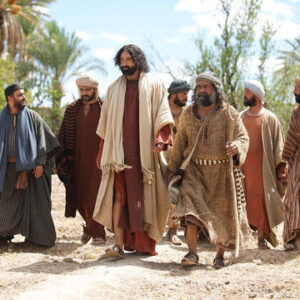 Just as Peter is called the fisherman, Matthew the tax collector, and Judas the traitor, so Simon is called the Zealot. We know him by name only and not by his words or actions, for there is no recorded information about this man other than his descriptive name.
Just as Peter is called the fisherman, Matthew the tax collector, and Judas the traitor, so Simon is called the Zealot. We know him by name only and not by his words or actions, for there is no recorded information about this man other than his descriptive name.
In New Testament times, there were four basic parties, or sects, among the Jews. The Pharisees were the staunch traditionalists, or fundamentalists. The Sadducees were the well-to-do, influential, liberal, Greek-minded sect that controlled the temple. The Essenes were a group of celibates who lived in the desert region. (They were the keepers of the Dead Sea Scrolls.) The last group was the Zealots.
The Zealots were extremists opposed to Roman rule. They detested Rome and its powerful control over the Jewish people. Their hope was for the Messiah to come and restore his kingdom on earth. They were a terrorist group that took every opportunity to assassinate and kill Romans and their sympathizers.
How Simon the Zealot got to know the Lord is a mystery. Perhaps he hoped that Jesus would be the one to overthrow Roman authority. Little did he realize that he would soon be fighting a far greater oppressor than Rome.
As a Zealot, Simon once lived his life on the opposite end of the spectrum from Matthew. Matthew, a Roman sympathizer who was hated by the Jews because he was a tax gatherer, was despised by the Zealots of his day. Simon, the tax hater, once might have considered a dagger for Matthew, the tax collector. Later he became a compatriot of Matthew’s, spreading the gospel of Jesus Christ to the remote corners of the world.
Here we can appreciate the beauty of the Christian church. Coming together as a people of every possible race, political background, nationality, and personality, Christians rise up to form a church that is alive with love for one another. Each member becomes a servant of the Master, Jesus Christ. The miracle of joining 12 men together with such opposite natures and personalities is mirrored in the miracle of an entire church that spans the globe. As one psalm writer says, “I am a friend to all who fear you, to all who follow your precepts” (Psalm 119:63).
Since he is listed among the minor apostles, it is often suggested that Simon and Judas Iscariot were paired together when the Savior sent them out among the people.
Simon’s life as a politically minded Zealot was left behind as he grew ever closer to his Savior. Although there are no recorded spoken words by Simon in Scripture, he was indeed chosen for his spiritual qualities. The Lord wanted him to play an important part in the formation and growth of the early Christian church. Perhaps this fiery revolutionary was picked because he was better prepared to die for a cause.
Tradition says that Simon preached to the people of the British Isles. Quite likely he was martyred for sharing the gospel message. Simon was once willing to die for his zealous political views and possibly paid the ultimate price as a zealous defender of the gospel of his Lord and Savior Jesus Christ.
Next October 28 is St. Simon’s Day. Remember this man and consider the zeal that he had for the gospel of Jesus. Do you have the same fiery zealousness as Simon?
Come, Holy Spirit, from above
With Thy celestial fire;
Come with the flames of zeal and love
Our hearts and tongues inspire.
(from “Come, Holy Spirit, from above”)
